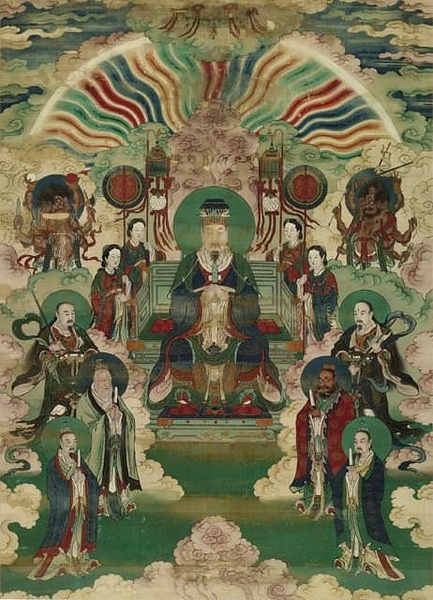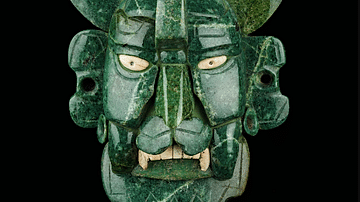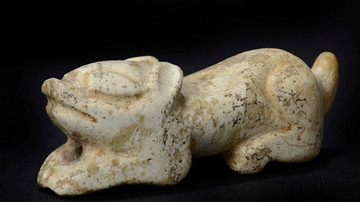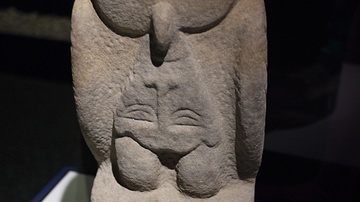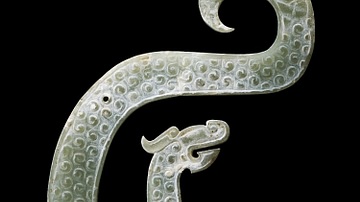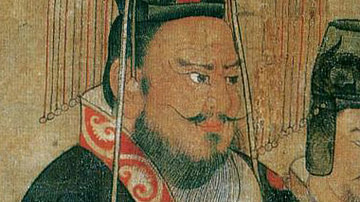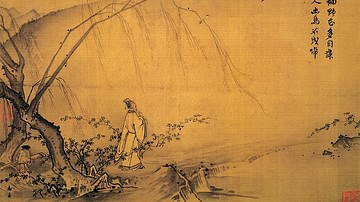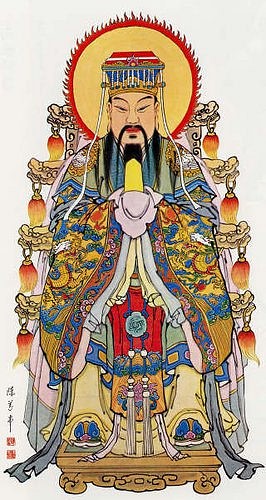
The Supreme August Jade Emperor is the supreme deity of Chinese tradition and is otherwise known as Yuhuang Shangdi (Yu-huang Shang-ti), Yudi (Yu Ti) or Mr. Heaven (Lao-t'ien ye). He governs the cosmos and resides in a magnificent palace in the highest part of heaven along with his large family and entourage of ministers and officials.
The god originated in ancient Chinese folk religion and oral mythology but he was officially incorporated into the state-sponsored Chinese religion by Emperor Shenzong (Shen-tsung) of the Song Dynasty after the emperor had claimed to have seen the god in a vision on a particular night in 1007 CE. The Jade Emperor should not be considered a creator god as in Chinese traditional religion no deity is involved in the Creation. Rather, it is believed that the universe came into existence from the union of matter (K'i) and movement (Li) which, according to the principle of yin and yang, infinitely alternate to produce the five elements of metal, wood, water, fire and earth. Therefore, the supreme god is seen more as an anthropomorphic representation and guardian of morality.
The Jade Emperor is believed to have been the disciple of the Primordial Heaven-honoured One, Yuanshi Tianzun (Yuan-shi T'ien-tsun) from whom he inherited the governance of the universe. In turn, the Jade Emperor will hand over the reigns of power to the Heaven-honoured One of the Dawn of Jade of the Golden Gate (Kin-k'ue Yu-chen T'ien-tsun).
In his palace in heaven, the Jade Emperor lives with his wife the Jade Empress, Tianshang Shengmu or Mazu (Yu-huang sheng-mu or Ma-tsu) and their large family. Prominent members include his nephew Yang Shen (Yang Tsien), otherwise known as the Second Lord of Quality, Erlang Shen (Er-lang Tsien) whose Celestial Dog - Tiangou (T'ien K'ou) - chases away evil spirits. One of the Jade Emperor's secondary wives is the Horse Head goddess, who is believed to care for silkworms, producers of the precious Chinese commodity, silk. One of the god's daughters is Miss Seventh or Shi Quning (Ts'i-ku-niang), who is appealed to by young women in order to reveal the identity of their future husbands.
The heavenly palace of the Jade Emperor is managed by Wang the Transcendent Official, otherwise know as Lingquan (Ling-Kuan), who also protects mortals from evil spirits. One of his functions is keeper of the palace gates where he stands guard wearing armour and wielding his heavy staff to ward off unwelcome visitors. He also runs errands for the Jade Emperor such as punishing wrongdoers and righting wrongs. The palace also has an extensive staff of attendants, ministers, officials and lesser gods paralleling the unwieldy bureaucracy of the Chinese state.
Taoists, in particular, have classified and codified all of these deities and ministers into a whole belief system. All of the members of the palace household must present themselves before the Jade Emperor and account for their actions on a fixed day every year, often on New Year's Day. Also on this day the other major gods in the Chinese pantheon must come from their respective domains and pay homage to their master the Jade Emperor. Good deeds are rewarded, usually through promotions and a greater allocation of luck and happiness for the forthcoming year. Bad deeds are justly punished, for example by a reduction in heavenly rank. Humanity is similarly judged through bulletins from gods such as the kitchen god who reports the conduct of families to the Jade Emperor.
In Chinese art, the Jade Emperor is most often portrayed with long hair and moustaches and seated on a throne dressed in full imperial costume - the long, dragon-embroidered robe and mien (hat) with thirteen pearl-strung tassels - and holding the kuei or imperial ceremonial tablet.
